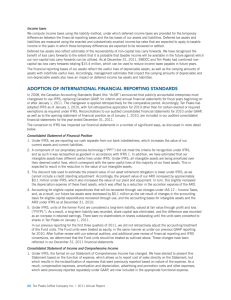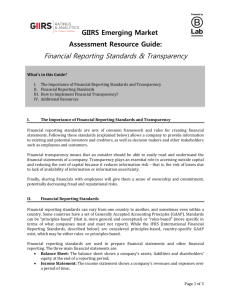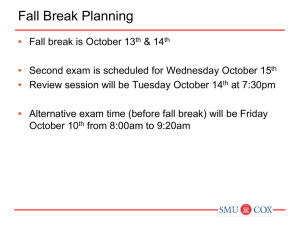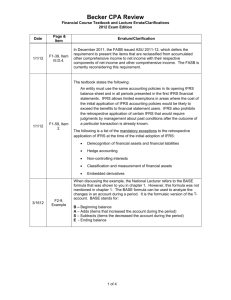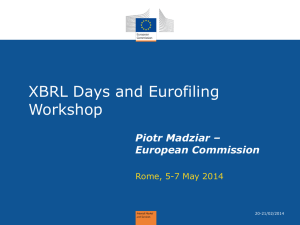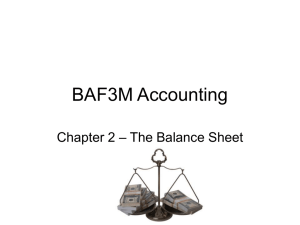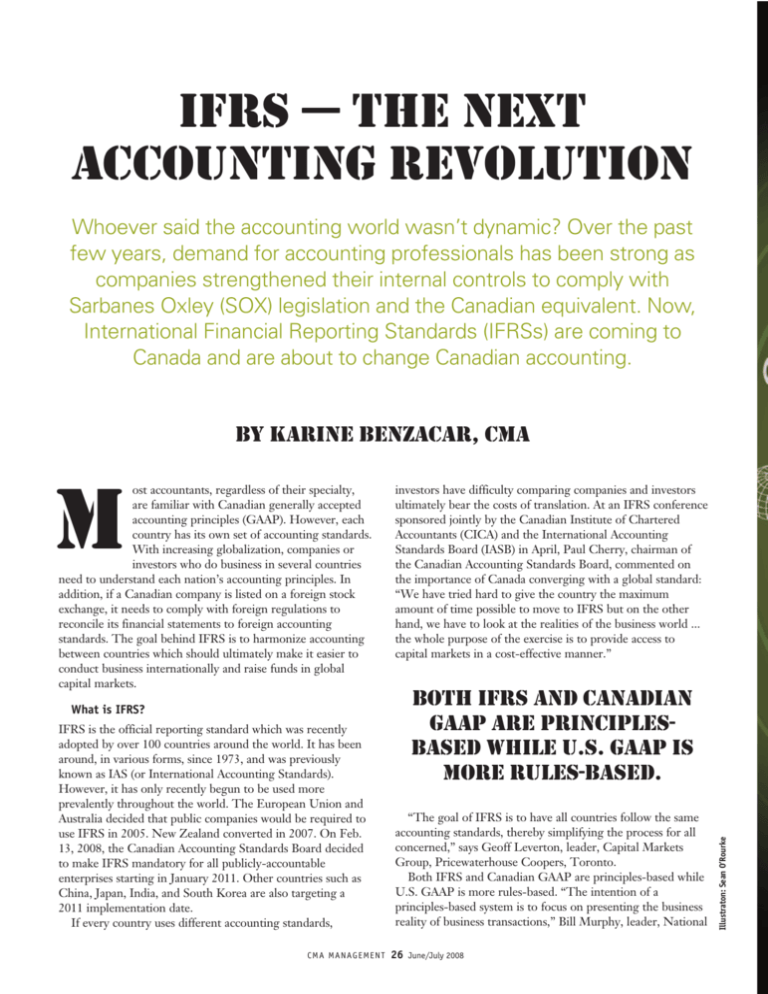
IFRS — THE NEXT
ACCOUNTING REVOLUTION
Whoever said the accounting world wasn’t dynamic? Over the past
few years, demand for accounting professionals has been strong as
companies strengthened their internal controls to comply with
Sarbanes Oxley (SOX) legislation and the Canadian equivalent. Now,
International Financial Reporting Standards (IFRSs) are coming to
Canada and are about to change Canadian accounting.
ost accountants, regardless of their specialty,
are familiar with Canadian generally accepted
accounting principles (GAAP). However, each
country has its own set of accounting standards.
With increasing globalization, companies or
investors who do business in several countries
need to understand each nation’s accounting principles. In
addition, if a Canadian company is listed on a foreign stock
exchange, it needs to comply with foreign regulations to
reconcile its financial statements to foreign accounting
standards. The goal behind IFRS is to harmonize accounting
between countries which should ultimately make it easier to
conduct business internationally and raise funds in global
capital markets.
investors have difficulty comparing companies and investors
ultimately bear the costs of translation. At an IFRS conference
sponsored jointly by the Canadian Institute of Chartered
Accountants (CICA) and the International Accounting
Standards Board (IASB) in April, Paul Cherry, chairman of
the Canadian Accounting Standards Board, commented on
the importance of Canada converging with a global standard:
“We have tried hard to give the country the maximum
amount of time possible to move to IFRS but on the other
hand, we have to look at the realities of the business world ...
the whole purpose of the exercise is to provide access to
capital markets in a cost-effective manner.”
BOTH IFRS AND CANADIAN
GAAP ARE PRINCIPLESBASED WHILE U.S. GAAP IS
MORE RULES-BASED.
What is IFRS?
IFRS is the official reporting standard which was recently
adopted by over 100 countries around the world. It has been
around, in various forms, since 1973, and was previously
known as IAS (or International Accounting Standards).
However, it has only recently begun to be used more
prevalently throughout the world. The European Union and
Australia decided that public companies would be required to
use IFRS in 2005. New Zealand converted in 2007. On Feb.
13, 2008, the Canadian Accounting Standards Board decided
to make IFRS mandatory for all publicly-accountable
enterprises starting in January 2011. Other countries such as
China, Japan, India, and South Korea are also targeting a
2011 implementation date.
If every country uses different accounting standards,
CMA MANAGEMENT
“The goal of IFRS is to have all countries follow the same
accounting standards, thereby simplifying the process for all
concerned,” says Geoff Leverton, leader, Capital Markets
Group, Pricewaterhouse Coopers, Toronto.
Both IFRS and Canadian GAAP are principles-based while
U.S. GAAP is more rules-based. “The intention of a
principles-based system is to focus on presenting the business
reality of business transactions,” Bill Murphy, leader, National
26
June/July 2008
Illustraton: Sean O’Rourke
M
BY KARINE BENZACAR, CMA
CMA MANAGEMENT
27
June/July 2008
IFRS Advisory Services, KPMG, Toronto, says. “However,
since a principles-based system relies on the professional
judgment of those applying the standards, it may be possible
for two well-qualified accountants to apply the standards
differently.” As a result of this factor, IFRS requires more
disclosures than Canadian GAAP.
not mean identical and experts across the industry all agree
that IFRS implementation can be just as large an undertaking
as Sarbanes Oxley (SOX) implementations were. The
common theme among organizations who have begun
implementing IFRS is that there is a lot of work involved in
order to understand the impact that IFRS will have on the
organization.
SOME INDUSTRIES WHERE IFRS WILL MEAN SIGNIFICANT
ACCOUNTING CHANGES ARE FINANCIAL SERVICES,
UTILITIES SUBJECT TO RATE REGULATION, INSURANCE,
MANUFACTURING, AND OIL AND GAS.
In the mid 1990s, Canada began aligning its accounting
standards with U.S. GAAP, especially since more and more
companies began to tap into U.S. capital markets for
financing. However, after the Enron collapse, the Canadian
Accounting Standards Board started to rethink its strategy of
aligning with the U.S. and began leaning toward the
international standards.
Although IFRS is similar to Canadian GAAP, similar does
What is the U.S. doing about IFRS?
Historically, Canada has followed the U.S. for accounting
guidance, up until recently. The U.S. has been slow to
adopt IFRS. A few years ago, the Financial Accounting
Standards Board (FASB), the governing accounting body in
the U.S., was not very receptive to IFRS. However, the
board’s opinion is beginning to change. As the majority of
developed nations move toward IFRS, the US is beginning
to reconsider its decision to maintain US GAAP. More and
more money is being raised in capital markets outside of
the US than ever before. “In order to continue to be
considered a major economic player and maintain their
position as one of the leaders of a global economy, it’s
likely that Americans will eventually conform to the
international standard,” says Leverton of PricewaterhouseCoopers. In fact, effective Mar. 4, 2008, the U.S. Securities
Exchange Commission (SEC) is allowing listed foreign
private issuers (i.e. non-U.S. companies listed on American
stock exchanges) to report their financial statements using
IFRS rather than U.S. GAAP. This alleviates foreign
companies from reconciling their statements to U.S.
standards. The general consensus among experts is that the
U.S. will convert to IFRS, probably in 5 to 7 years. For a
change the U.S. will be copying Canada and not the other
way around.
CMA MANAGEMENT
Linda Mezon, chief accountant at RBC Financial Group,
summarized the conversion process when addressing
accountants at the April CICA/IASB conference: “Canadian
GAAP is similar to IFRS but there are changes and you will
have to be aware of those changes. The trick is for you to
understand those changes and how they apply to your
business.”
One big advantage that Canadian businesses have is that
they can rely on the experience of their European
counterparts and that Canadian standards are much more
similar to IFRS than many of the former European standards
were. Sir David Tweedie, chairman of of the IASB says,
“What people don’t realize is that the European changeover
went very well. The advantage Canada has compared to
Europe is that the [Canadian] standards are very similar.”
How are organizations affected?
Only publicly accountable enterprises such as public and
crown corporations as well as other entities, such as
government business enterprises and government businesstype organizations, are immediately affected by IFRS. They
are mandated to change their reporting to comply with IFRS.
If a Canadian public company doesn’t convert to IFRS by
2011, its stock could de-listed from Canadian stock exchanges.
Private enterprises that are subsidiaries of multinational
corporations may be directed by their parent to change.
The requirements for private companies, pension plans,
public sector entities, and not-for-profit organizations have
not yet been finalized but each of these sectors may end up
with its own specific set of accounting standards. “It is likely
that there will be a number of different sets of accounting
standards in Canada, as many as five or six sets of standards,
each with varying degrees of IFRS content depending on the
type of entity involved,” Murphy, says.
Most companies will be impacted by IFRS but different
industries will face different challenges. “Converting to IFRS
can take at least two years, depending on the complexity of
the organization,” Leverton says. “Small firms in simple
industries will likely have a shorter implementation period
than large multinationals operating with different business
28
June/July 2008
platforms with numerous legacy systems.”
Some industries where IFRS will mean significant
accounting changes are financial services, utilities subject to
rate regulation, insurance, manufacturing, and oil and gas.
“On a conceptual basis, IFRS and Canadian GAAP are very
similar. However, across many aspects, there are significant
differences when one starts looking at the two reporting
standards in detail,” Matt Bootle, partner, Professional
Practice Group, Ernst and Young, Calgary. “The specific
differences will depend on the particular industry and the
actual company.”
Some major examples of differences between Canadian
GAAP and IFRS include the following:
●
Business combinations: There are a number of changes
to rules related to business combinations, which occur
when companies acquire control or significant influence
over other companies. Assets and liabilities acquired will
be reported at 100 per cent of their fair value, even if less
than 100 per cent of the business is acquired. Under
current GAAP, only the portion that the buyer is
acquiring is reported at fair value; the rest is reported at
book value. The acquirer will also need to expense
acquisition related costs rather than including them in
goodwill as is currently done under Canadian GAAP. If
the fair value of the assets acquired exceed the fair value
●
●
of the consideration paid, under IFRS the difference is
considered a bargain purchase and included in income.
Consolidation methods of joint ventures: Currently,
joint ventures are accounted for using the proportional
method of accounting; this means that each company
records its proportionate share of assets, liabilities, and
income in its own books account by account. IFRS rules
will account for them under the equity method of
consolidation. This means that the company will report
only its share of income in the joint venture.
Impairment of non-financial assets: The impairment
tests for non-financial assets, such as fixed assets and
goodwill are based on discounted cash flows for the
relevant cash generating units (CGUs). Since CGUs may
need to be identified at a more granular level than
reporting segments, a company may end up recognizing
impairment charges sooner or more frequently under
IFRS than under Canadian GAAP. A further difference
between Canadian GAAP and IFRS is that IFRS requires
companies to reverse previous impairment write-downs,
other than for goodwill, if the conditions that caused the
impairment no longer exist. “These changes effectively
could make net income more volatile than what we see
now,” Murphy says.
YOUR CLIENTS’ BUSINESSES ARE GROWING.
THEIR ACCOUNTING SOFTWARE SHOULD TOO.
Introducing Simply Accounting by Sage Enterprise, the software solution that
grows with your clients’ business needs. With powerful tools like role-based security
and serialized inventory as well as a redesigned, easy-to-use interface, moving to the
next level is, well, simple. Designed for 5 or 10 users, it was developed specifically for
Canadian businesses. For a pain-free way to improve your performance, get the new
Simply Accounting Enterprise. And watch everyone’s business prosper.
See a free demo of Simply Accounting by Sage Enterprise at simplyaccounting.com/enterprise
© 2008 Sage Software, Inc. All rights reserved. Sage Software, the Sage Software logo and Sage product and service names mentioned herein are registered trademarks
or trademarks of Sage Software, Inc. or its affiliated entities.
CMA MANAGEMENT
29
June/July 2008
DENTSU
72613
RG
What is the best way to convert to IFRS?
Public companies should already be looking at the impact of
IFRS on their reporting and should be planning for their
conversion. Although a conversion date of January 2011
seems far away, the timelines are actually much shorter than
they seem. In order to report a comparative balance sheet on
January 2011, the best approach for companies is to begin
keeping a parallel IFRS set of books starting in 2010. If
systems changes are required, they will need to be done and
tested in 2009. Since we are already halfway through 2008,
there really isn’t much time left to undertake the
implementation.
their financial staff to assume IFRS responsibilities in
addition to their daily roles, but this is a mistake. “For any
enterprise, this is much more than a technical exercise. The
implementation will need to involve many groups, both
internal and external to the organization and ensure that the
message is properly communicated to external stakeholders,”
Bootle says. The team should be led by a professional
project manager and should comprise IT staff and change
management professionals in addition to financial reporting
individuals. Communication across all levels and functions of
the organization is important.
PUBLIC COMPANIES SHOULD ALREADY BE LOOKING AT
THE IMPACT OF IFRS ON THEIR REPORTING AND SHOULD
BE PLANNING FOR THEIR CONVERSION.
IFRS conversion is a large project and like any large
project, effective project management is critical. There
should be a cross-functional team assembled to manage the
migration. Many organizations might be tempted to ask
Entities affected by IFRS
The Accounting Standards Board requires that all Canadian
reporting entities be required to apply IFRS after Jan. 2, 2011
with the exception of the following:
(a) Private enterprises, that is, profit-oriented entities that:
(i) have not issued (and are not in the process of issuing)
debt or equity instruments in a public market; and
(ii) do not hold assets in a fiduciary capacity for a broad
group of outsiders.
Entities with fiduciary responsibility, such as banks, credit
unions, insurance companies, securities brokers/dealers,
mutual funds, and investment banks, stand ready to hold
and manage financial resources entrusted to them by
clients, customers or members not involved in the
management of the entity.
(b) Not-for-profit organizations, as defined in the CICA
Accounting Handbook.
(c) Public sector entities to which the standards contained in
the CICA Public Sector Accounting Handbook apply.
-
excerpt from the CICA exposure draft on Adopting IFRSs in Canada (April 2008)
CMA MANAGEMENT
Who does IFRS impact?
IFRS will impact almost everyone. The implications of IFRS
are much broader than financial reporting. Like SOX
implementations, it’s likely that IFRS implementations will
require large system changes; this means that IT specialists
will be busy over the next few years. Many companies
currently have executive compensation packages which are
based on net income. Since net income will change under
IFRS reporting, it may be necessary to alter some of the
compensation formulas. It is also necessary to communicate
the impact of IFRS changes to anyone affected by the
change in financial reporting — such as bankers, who
typically use financial ratios in lending decisions and debt
covenants, stock analysts, and portfolio managers. This
means that, not only should professionals in these fields
update their knowledge, but investor relations’ departments
should start strategizing on how to best communicate the
impact of accounting changes on results.
Anyone who either prepares or relies on financial results
needs to understand the impact of IFRS on an organization.
While financial employees and those involved in an IFRS
migration will need to understand the details behind IFRS,
non-financial managers may only need a high-level
awareness of the issues so that they can supply the proper
information to those responsible for the implementation. In
any event, one thing is certain — although many people
haven’t heard about IFRS today, in a couple of years, it will
become standard accounting terminology. ■
Karine Benzacar, MBA, CMA, CPA (Del.), (karine@knowledgeplus.ca) is managing
director of Knowledge Plus Corporation, an organization providing business
consulting and corporate training services across North America, specializing in the
field of finance. (www.knowledgeplus.ca)
30
June/July 2008


